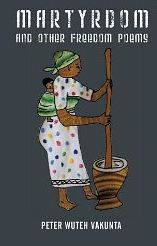i-Universe. 2010. 101 pp. Paper, $9.99. ISBN 978-1-4502-5141-9
Reviewer: Benjamin Kwakye
It is remarkable that in only forty-nine poems, Peter W. Vakunta’s Martyrdom and Other Freedom Poems seamlessly covers issues spanning the personal, national and international landscape. At times reminiscent of Achebe’s accessibility, scope and depth in Beware, Soul-Brother, and Other Poems, Vakunta’s Martyrdom is poignant in its assuredness. But Martyrdom carves out its own path in a vision that is both unrelentingly reproving and tender.
This duality is evident in the preface, which sets a hilarious tone with a pretense debate over who would have the audacity to pen the ensuing poems. The author writes that “[a] true son of the soil would never have the temerity to write down such balderdash about his homeland” (ix). But this is only a cloak to conceal the venomous truth the poet is about to proffer. Vakunta then proceeds to unveil and decry many of the woes besetting the nation (Cameroon) as well as the continent (Africa). And what a mighty sword of a pen he wields. His pen hangs over us all like the sword of Damocles. As the poet writes in Barrel of the Pen, “[m]y pen scribbles to kill” (50).
Thus, the representative Apocalypse stings in its lament over the “vicious cycle” of colonialism, neo-colonialism, wars, corruption, etc. (97), in as much as the hopefulness of Long Awaited Day uplifts: “The powerful will no longer/Dispossess the powerless of their land” (27). The poet does not blink in his poetic mission as when he sounds the clarion call to action in The Rabble, so that “The Onus is ours/To rescue Africa” (7) or strikes an almost mournful tone in Rainstorms, in which: “Often times/We’ve been branded/Beasts of no nation” (14).
If Vakunta is rightly unapologetic about the vitriolic exposé of the ills plaguing his society, his keen focus purposefully makes occasional forays into the laudatory or tender as the ode to Obama in The Maverick (41) or the summons to “Take time to love/Love is a pearl” in Time (45), or the tender tribute to “my wife” in Better Half (47). Sometimes, the poet invokes outright hilarity as seen in Fifth Commandment (67-68) in which a son misappropriates the money donated by his brothers for their dead father’s journey to the land of the ancestors in exchange for a check. The object of the poet’s opprobrium here is unbridled self-seeking greed.
Martyrdom is interspersed with Pidgin English, commonly spoken in the West African region, as well as local languages. But rather than detract from the quality of the work, recourse to indigenous tongues adds local color and flavor that authenticate Vakunta’s approach to social critique. One can easily imagine his words emanating from the storehouse of the linguistic syncretism of sages. Martyrdom is outstanding in its ability to combine a panoramic view with accessibility and depth to create a work of evident value. The suitability of this book of poems resides in the plentitude of its themes. The poet’s diction is free of sophistry. Vakunta’s Martyrdom is appealing to readers from all walks of life on account of the universality of themes adumbrated. It is worth the read.
About the author
Benjamin Kwakye is a Ghanaian novelist. His first novel, The Clothes of Nakedness, won the 1999 Commonwealth Writers Prize, best first book, Africa. His second novel,The Sun by Night won the 2006 commonwealth Writers’ Prize, Best Book Africa. His third novel,The Other Crucifix won the 2011 IPPY award.He graduated from Dartmouth College and Harvard Law School. At present, he practises law in Chicago, and is director of the African Education Initiative.
See online: A Continent that self-destructs: Review of Peter Vakunta’s Martyrdom and Other Freedom Poems

